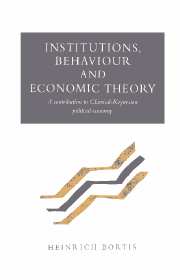Book contents
- Frontmatter
- Contents
- Preface
- Acknowledgements
- Glossary of symbols
- 1 Introduction
- 2 Some basic concepts and issues in the social sciences
- 3 Some basic issues in political economy
- 4 Towards a coherent system of political economy
- 5 Classical-Keynesian political economy and neoclassical economics
- 6 An alternative theory of economic policy
- 7 Political economy in a wider context
- References
- Index
4 - Towards a coherent system of political economy
Published online by Cambridge University Press: 14 January 2010
- Frontmatter
- Contents
- Preface
- Acknowledgements
- Glossary of symbols
- 1 Introduction
- 2 Some basic concepts and issues in the social sciences
- 3 Some basic issues in political economy
- 4 Towards a coherent system of political economy
- 5 Classical-Keynesian political economy and neoclassical economics
- 6 An alternative theory of economic policy
- 7 Political economy in a wider context
- References
- Index
Summary
The classical economists dealt with all the great problems of economic theory – i.e. value, distribution, growth, proportions between sectors – except the determination of the employment level. Based upon Say's law they postulated that saving governs capital accumulation to determine employment in the long run. In the classical view persistent unemployment could only arise because of insufficient capital accumulation relative to population growth. A lack of overall demand for goods that would result in a general glut in the markets was excluded by Say's law. The classicals entirely neglected the mercantilist heritage that was taken up again by Keynes (chapter 23 of the General Theory).
At the outset of the final chapter of the General Theory, Keynes states that the persistence of involuntary unemployment represents the major problem of our times. In his early writingś, especially in his Paris Manuscripts (Marx 1973 [1844], pp. 510–22), and in Das Kapital Karl Marx considers involuntary unemployment – the existence of an industrial reserve army – a crucial ingredient of alienation, which has been defined as the gap existing between some prevailing social situation and an ideal state of affairs in which the common weal would be realized (chapter 2, pp. 39–53).
Both Marx and Keynes held the opinion that involuntary unemployment was not due to some ethical shortcoming of entrepreneurs or workers, nor to a market failure, but was due to a basic defect of the socioeconomic system which Keynes denoted a monetary production economy. Because of the social importance of persistent involuntary unemployment, the present chapter is essentially devoted to this and to associated problems.
- Type
- Chapter
- Information
- Institutions, Behaviour and Economic TheoryA Contribution to Classical-Keynesian Political Economy, pp. 131 - 251Publisher: Cambridge University PressPrint publication year: 1996



